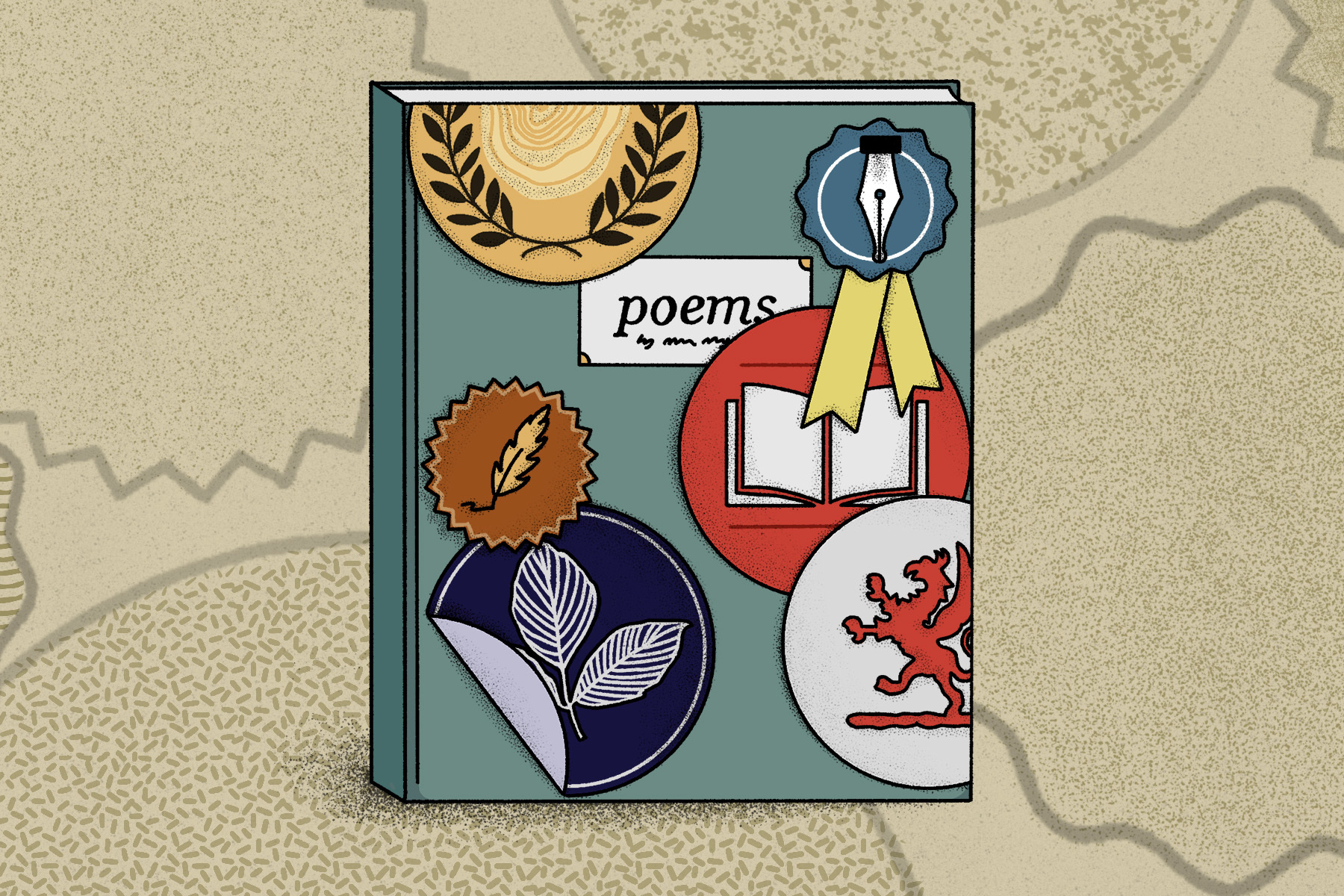On September 8, 2022, the Griffin Poetry Prize became, by its own estimation, the largest prize in the world for a single book of poetry in English. Previously, the organization had administered an international award and a Canadian one, each valued at $65,000. Winners of the latter have included Toronto’s Christian Bök, the avant-garde darling behind the bestselling collection Eunoia, and Saskatchewan native Karen Solie, whose work is now released by presses in the UK and the US. But the category that helped establish their reputations will no longer exist. Henceforth, there will be a single award of $130,000, open to writers worldwide. The Canadian stream is to be eliminated.
Fallout on social media was swift. Montreal poet Sina Queyras condemned the change on Twitter as an example of “toxic individualism” that focused on “celebrating and centering the few.” Kenzie Allen, a poet who teaches at York University, went further, pondering whether “the trustees actively want to suppress Canadian authors/poetry.” Commentators lamented the loss of exposure and opportunity, given the role the award played in securing grants and jobs. Some expressed their desire for community over competition, while others despaired that the new format would primarily benefit American or British poets.
The prize’s founder, Scott Griffin, had anticipated some controversy, if not this degree of fury. He maintains trustees made the right call. After twenty-two years, it was time to revisit the prize structure and the question whether Canadian poets still needed their own category. “We have this curious dichotomy where we lose our confidence that we can’t compete internationally or can’t contribute internationally,” Griffin told me. “But that’s a huge mistake, in my opinion.” The new system challenges protectionist impulses by throwing Canadian poets in with the rest—depriving them of guaranteed spotlight but also giving them a chance at the larger prize.
At the same time, the change underscores the delicate dynamic between patron and community. Without the involvement of recognized writers as judges and trustee members, the Griffin Poetry Prize would have no cultural authority. Without Scott Griffin’s money, the prize would not exist. And, where government institutions like the Canada Council for the Arts have a mandate to develop the local scene, philanthropists can, at the end of the day, do whatever they think is best. But is this change really for the best?
In The Economy of Prestige, James F. English argues that cultural awards are inherently messy mechanisms. Interpreted liberally, they have existed at least since the sixth century BCE, when Athenian content creators (poets, playwrights, musicians) squared off during the festival of Dionysus. The contemporary form of the awards, however, is a twentieth-century phenomenon, inaugurated by the Nobel in 1901 and immediately followed by the Pulitzer and the Prix Goncourt. According to English, awards should not be viewed too cynically: “Generosity, celebration, love, play, community are as real a part of the cultural prize as are marketing strategy and self-promotion.” Yet there is something uncomfortable about the way they connect art and money, recognition and the marketplace. Whereas other forms of patronage sponsor artists directly in exchange for their work, awards both invoke the logic of impartial meritocracy and set the stage for drama. Even in a field as far removed from sporting contests as poetry, they invite the public to wait anxiously for the winner to emerge.
Since its founding in 2000, the Griffin Poetry Prize was built for glamour. The size of the purse was calculated to capture attention. Initially set at $40,000, it was over double the UK’s T. S. Eliot Prize (then £10,000) or the Pulitzer Prize for Poetry (then $5,000, US). On the Canadian stage, the prize was as big as the Giller and the Governor General’s Literary Award combined. “We felt we had to come out with a real statement about poetry,” Griffin explains. Largesse let him communicate that verse deserved as much respect as other literary genres, and spectacle reinforced the message. Finalists gathered to read at Koerner Hall, an elegant venue operated by Toronto’s Royal Conservatory of Music that seats over 1,000 people. This public event was followed the next day by a gala nicknamed the “Poetry Prom,” where another 300 to 400 guests gathered to feast, dance, and hear the winners announced.
Still, it was never just a show. Scott Griffin has repeatedly stated his desire to reintroduce poetry “to the mainstream of our cultural lives”—which requires cultivating an audience for it through the school system. Since 2010, his foundation sponsors Poetry in Voice, which features a nationwide, bilingual recitation competition that targets middle school and high school students. The organization also provides free teaching resources, publishes a student journal, and facilitates classroom visits by poets. These initiatives cost more than the Griffin Poetry Prize itself. His influence in Canadian publishing extends still further: he bought out the storied Toronto indie publisher House of Anansi for $400,000 in 2002, saving it from bankruptcy. (He is also on the board of directors for Literary Review of Canada, where I am a contributing editor.)
While the size of his namesake award may have, in Griffin’s words, “allowed us to get on the map,” its cultural legitimacy has little to do with the source of funding. From the start, the philanthropist recruited Canada’s most anointed writers to help implement his vision, with Margaret Atwood and Michael Ondaatje among the original team. Esteemed poets decide the shortlists and winners. This mix of cash and prestige has given the prize a key role in Canadian poetry’s ecosystem. Poets declare the transformative effects of making the shortlist, with newcomers occasionally converted into authorities. Billy-Ray Belcourt, for example, was twenty-three when he snagged the Canadian award for his first book, This Wound Is a World. He sobbed through his acceptance speech and later called the award an investment in queer, Indigenous voices.
The prize’s success in becoming an institution can conceal the fact that its existence is contingent on a wealthy man who happens to like poetry. The great-grandson of a rail baron and former head of an auto-parts company, Griffin attributes his love for the genre to his father, who would read Ezra Pound and T. S. Eliot to him when Scott was young. He also speaks admirably of Arthur Motyer, a professor at Bishop’s University who could rattle off Dylan Thomas by heart. Hence, one assumes, the emphasis on performing poems in the Griffin Trust’s programming.
If philanthropists endow causes for personal reasons, they can change their minds on the same grounds. One of the immediate catalysts to alter the Griffin Poetry Prize was the “Poetry Prom.” Though the evening was “great fun,” Griffin had philosophical objections. Some guests came to the gala but skipped the public readings the day before, while those who paid to hear the poets at Koerner’s Hall were not around when the winners were announced. Then there were the logistics, as he, his wife, and his executive assistant largely organized the evening on their own. “It was like having a major wedding twenty-two consecutive years in a row. Finally, my wife said, ‘We can’t do this anymore.’” He resolved to eliminate the gala in 2023. This change opened the door to rethinking the prize as a whole.
The choice to launch a combined prize involved a multiyear process of consultations, in collaboration with a board of trustees that featured two Canadian and five international members. Griffin explains that when the prize was created, he had thought that Canadian poets were so little known that they needed an advantage. Now, providing them with a separate award had become a source of discomfort. “There’s a kind of structural, inherent unfairness about having judges judge 600 submissions but keeping a certain number of them for the Canadians anyway.” Griffin also wanted to make sure Canadian poets were properly considered for the international prize rather than being routed toward the domestic one. On an ideological level, he was wary of encouraging a vision of Canadian arts that is “parochial and territorial, tribal.” The same desire for worldliness had long motivated him to make poetry translations into English eligible, with 60 percent of the money going to the translator.
In this regard, the Griffin trustees are following the same path as the Booker Prize—and courting the same controversy. Until 2014, the Booker was only open to writers from the Commonwealth, Ireland, and Zimbabwe. Now all novels in English are eligible, which has led to complaints about the dominance of US authors on its longlists. In 2018, a letter signed by thirty figures in the publishing industry asked the trustees to reconsider the decision, arguing that “in a globalised but economically unequal world,” the change made readers less likely to “hear voices not from the centres.”
It is hard to evaluate if this fear is well founded: of the ten awards granted since the change, only two have gone to Americans (and one to a Scottish American dual citizen). Meanwhile, the International Dublin Literary Award, an English-language prize designed to be global in scope and open to translations, has avoided being dominated by any one nationality. Since the first prize was handed out in 1996, it has been won by five Irish writers, four British authors, three Americans, and two Canadians (Alistair MacLeod and Rawi Hage), among a variety of international authors.
On the domestic front, the decision to eliminate the Canadian award taps into long-standing cultural debates: What is Canadian literature’s relationship to material from elsewhere? Where is the balance between domestic development and international influence, between fostering a local scene and competing on the global stage? Back in 1943, in the first edition of The Book of Canadian Poetry, A. J. M. Smith controversially divided the field into “native” and “cosmopolitan” strands, showing a clear preference for Canadian poets who made a “heroic effort” to open themselves up to a “universal, civilizing culture of ideas.” Arguably, the decision about the Griffin Poetry Prize issues a similar challenge to domestic players to be more ambitious.
Of course, it is one thing to have a worldly aesthetic and another to make a living. Kaie Kellough, who received the Griffin in 2020 for Magnetic Equator, points out that a large swath of contemporary Canadian literature already embraces international themes and settings. (His own prize-winning collection evokes Guyana alongside Calgary and Montreal.) Nevertheless, even the most global-minded writers still “have to live in a specific place” and grapple with “the domestic creative economy,” in which it’s nearly impossible to pay the bills from poetry alone. The role of awards is ambiguous here. While a prize as generous as the Griffin is higher than your average middle class salary, it’s hardly enough to transform a life. Kellough describes his win as a major lift for his reputation, but he has not quit his day job.
For Alicia Elliott, the economic benefits cannot be reduced to the prize money alone. Making the shortlist can pave the way for fellowships and teaching positions that might otherwise be out of reach. In an article for the CBC, she furthermore points out that over two-thirds of the Canadian nominees for the Griffin Poetry Prize have come from independent publishers that operate on government grants. As a result, “suggesting that any of these poets have ever been competing on ‘equal footing’ with better funded and more widely reviewed international poets and publishers seems disingenuous at best.”
Yet the matter of who is better funded is debatable, given that the international shortlist is likewise dominated by independent presses, often from the United States. Per capita, American poets seem to have access to significantly less state support. Despite Canada’s much smaller population, the Canada Council budget for 2020–21, at $315 million, trails only slightly behind that of its American equivalent, the National Endowment for the Arts (324 million CAD). What Americans do have on their side is more Scott Griffins. For example, the Chicago-based Poetry magazine received an estimated $100 million from Ruth Lilly upon her death in 2002, amounting to a permanent endowment for the magazine.
Elliott furthermore laments the loss of publicity for poets of colour, who have recently been prominent on the Griffin’s Canadian shortlist. Ian Williams, one of the award’s Canadian trustees, is less concerned in this regard. He told me in an interview, “I think we’re now entering a world where it’s impossible to neglect underrepresented voices. I just don’t see a jury going forward and having a shortlist or a longlist of all white male writers.” He views the surrounding controversy as raising issues about prize culture as a whole, with its emphasis on individual achievement, in an age of growing economic precarity. The solution may be to cultivate more communal forms of recognition that help support a larger number of practitioners.
Such collective mechanisms would risk being less showy. Scott Griffin already found that his award had less of an impact internationally than domestically, in part because of its size: “I had a number of Americans saying, ‘Well, yeah, okay, but with the exchange rate, it’s about a $30,000 prize or a $40,000 prize.’” (The previous winnings were actually closer to 47,000 in US dollars.) Doubling the pot might attract more global coverage for the winning poets. While this is good for poetry, it’s also good for the prestige of an award that carries the name of its sponsor.
It is easy to be skeptical about the motives of philanthropists. The most cynical interpretation of privately endowed prizes frames them as a form of reputational laundering. Alfred Nobel may have invented dynamite, but he is now associated with world peace; the Booker fortune, which funded the prizes until 2002, stems from slavery and indentureship in Guyana. Michael Lista levelled a similar accusation against Griffin in his 2015 Canadaland article “The Shock Absorber.” Griffin was then a controlling shareholder for General Kinetics, which manufactured shock absorbers for military vehicles. Lista discovered that the company had a subcontract as part of Canada’s controversial arms deal with Saudi Arabia. In his view, poetry was being funded with blood money, and writers across the country were willing to look the other way. A month after the article was published, Griffin sold his stake in the enterprise.
Conversely, the current backlash can be seen as a case of friendly fire that overlooks a long history of generosity. From the time of the prize’s founding, Canadian poets knew that, every year, three of them would have access to a national—if not international—audience. As Griffin declares, “After twenty-two years, at sixty-six spaces guaranteed, that’s a lot of exposure for Canadian poetry.” To preserve the prize’s role in discovering new voices, the trustees have also added a $10,000 award for a first book by a Canadian poet, in addition to an artist’s residency in Italy. Meanwhile, Griffin asserts that the new format is not set in stone. He even muses that there may be room for a different Canadian prize, fully separate from the international one, in the future—though he would love to see someone else found a rival award. At a certain point, he insists, “I can’t do everything.”
Aleš Šteger, one of the international trustees behind the redesign, is more categorical. Writing from his home in Ljubljana, Slovenia, he declares his support for the change and for the prize’s founder. “Personally, I know of no philanthropist in Europe who has given so much out of his own pocket to poetry, who has been comparably open to the world, and who, at the same time, with a special sense of his own environment, has created new possibilities for poetry and its visibility. Do you?”





